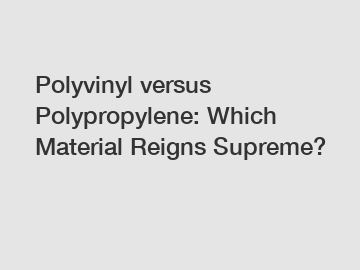Polyvinyl versus Polypropylene: Which Material Reigns Supreme?
In the world of manufacturing and consumer products, the choice of materials is crucial for ensuring durability, functionality, and overall quality. When it comes to plastic, two materials often stand out: polyvinyl and polypropylene. Both possess unique characteristics and are widely used across various industries. However, which material truly holds the crown? Let's dive into the depths of these two contenders and find out.
Polyvinyl (PVC):
Polyvinyl, also known as PVC, is a versatile thermoplastic that has become synonymous with durability. Widely used across the globe, PVC exhibits exceptional strength and resistance to chemicals, weather elements, and impact. This material is known for its excellent electrical insulation properties, making it a popular choice for applications in the electrical and construction industries.

In addition to its toughness, PVC offers an impressive flame retardancy characteristic, ensuring safety in demanding environments. It is commonly used in building materials such as pipes, window frames, and flooring due to its ability to withstand harsh conditions while maintaining its structural integrity.
Polypropylene (PP):
Polypropylene, on the other hand, boasts its own set of remarkable strengths. As a lightweight thermoplastic, PP is known for its chemical resistance, making it an ideal choice for applications involving corrosive substances. Its high melting point allows it to withstand extreme temperatures, making it an excellent choice for products that come into contact with heat.
PP's flexibility and fatigue resistance enable its use in a wide range of applications, including automotive parts, medical devices, and packaging materials. Its versatility and affordability have endeared it to manufacturers worldwide.
Comparative Analysis:
To determine the victor in this battle of the plastics, we must delve deeper into their respective characteristics.
Durability: .
Both PVC and PP are renowned for their durability. However, PVC's combination of high strength and resistance to impact and chemicals edges out PP in terms of sheer resilience.
Weather Resistance: .
When it comes to outdoor applications, PVC demonstrates superior weather resistance compared to PP. PVC's resistance to UV rays and moisture ensures its longevity, making it a popular choice for pipes, window profiles, and outdoor furniture.
Environmental Impact: .
While both materials have come under scrutiny for their environmental implications, polypropylene is considered more environmentally friendly. PP is known for its recyclability, making it a top choice for sustainable manufacturing practices.
Cost: .
In terms of cost-effectiveness, polypropylene has a distinct advantage. Its lower production costs and wide availability contribute to its affordability, making it an excellent choice for companies looking to minimize expenses without compromising on quality.
Conclusion:
In the battle between polyvinyl and polypropylene, there isn't a clear winner that reigns supreme. Both materials have their own strengths and applications, and the choice between the two ultimately depends on factors such as intended use, environmental concerns, and budgetary constraints.
Polyvinyl, with its exceptional durability and resistance to harsh conditions, excels in construction and electrical applications. Polypropylene, on the other hand, showcases its wide versatility, affordability, and environmental friendliness, making it a go-to option for an array of industries.
It is important for manufacturers to carefully consider the specific requirements of their project when deciding between these two materials. Ultimately, the material that reigns supreme will be determined by the unique needs and priorities of each individual application.
Whether it's the toughness of PVC or the flexibility of PP, these materials have undoubtedly revolutionized modern manufacturing. Both have carved out invaluable spaces across various industries, leaving their mark on countless products we use and rely on daily.
The company is the world’s best filler cooling tower liang chi, cooling tower nozzles types, cooling tower products supplier. We are your one-stop shop for all needs. Our staff are highly-specialized and will help you find the product you need.


